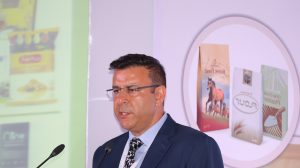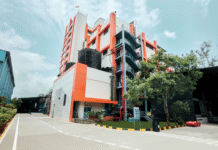A smaller conference in Delhi, the PackPlus Conclave held on the afternoon of 30 August had actually started with the idea of looking at how paper-based packaging can take advantage and make more space for itself at a time when plastic is under public attack. For seemingly lack of support from the paper & carton converters and suppliers, it actually became an excellent discussion on sustainability issues including flexible packaging.
The conference was organized in just four weeks since the acquisition of PackPlus by Reed, perhaps delayed due to some of the decision-making by new structure. Jointly organized by Reed and IppStar, the hard work of organizing by putting together sponsors, speakers and a program and delegates in a short time was challenging but ultimately fulfilling in terms of the macro and technical knowledge presented.

Assiduously led organization by packaging developer and environmentalist Deepak Manchanda with absolutely strong support from Reed’s Prateek Kaushik and a little effort from IppStar, the conference brought together industry leaders and experts even if it was not successful in attracting the kind of interest from packaging converters that this level and detail of discussion should have. The presentations and discussions revealed the knowledge and rational concern amongst the packaging and sustainability community in the Delhi-NCR that needs to be amplified. At IppStar we believe that the full-day PDIT2 Conference on 13 December 2019, also at Pragati Maidan, will be an appropriate place for this.

The sponsors of the PackPlus Conclave included two Delhi-NCR headquartered flexible packaging companies – Uflex, the largest Indian packaging conglomerate, and SB Packagings, a pioneer in PE-based flexible packaging in the country. The other sponsor was Markem Image, a company that is known for its end of line marking engine printing technology but which came across in its presentation as an end-to-end track and trace company providing machine-readable marking and scanning across production workflows and the packaging supply chain with its overarching software integration. In India, the company has a large software development team in addition to its equipment and ink plants.

A video of the Minister of Environment, Forests and Climate Change made clear that the government does not have any wholesale or irrational animus towards plastics or plastic. Nevertheless, packaging experts made it evident that the government is in a hurry for a solution to plastic waste and litter. It is likely to evaluate and seize whichever remedy or technology that it receives first.
The experts at the PackPlus Conclave made clear that packaging and sustainability is an enormous problem – one that is not likely to be either wished away or solved without concerted, unified and well financed platforms and efforts. Macro understanding and thinking and new ideas as well as practical reflections on what the Indian government is planning made for an excellent discussion. There was a sense of ownership and consensus on the need for waste collection systems and universal education.

Packaging expert S Chidambar pointed out that an even more compelling reason to come up with unified, large-scale and multi-pronged solutions is that as a species, we are simply running out of resources. In this respect, the so-called developed nations have not yet come up with answers either, although they may have better data.
The seemingly micro problem of waste collection was also discussed. Barun Banerjee of Nestle exposed the myth of Indian waste being miraculously and efficiently being collected by an army of poor people, often called rag pickers or scavengers. When he pointed out that 4,000 polybags need to be picked up and collected to make a kilo of plastic waste that may be sold for Rs. 20, it became clear that this method of waste collection oscillates between huge exploitation and totally unviable impracticality.

New ideas including the use of water-based coatings that improve some of the barrier properties of paper-based packaging and expand their use were presented. Practical solutions ranging from the use of PE-based single polymer flexible packaging that is both easier to recycle and has a higher value for waste collectors was talked about both by Amit Banga of SB Packagings as well as Sanjiv Jaggi of Constantia Hueck. Paper-based and liner-less labels were discussed.
It was mentioned that the brand owner group working on compliance with the Waste Management Order of the government by setting up a collaborative approach for implementation of their Extended User Responsibility program, has increased to 35 from the 25 of last year. We eagerly await the concrete actions and even preliminary results of these ERP efforts.
Significantly, at the PackPlus conclave, Shubi Sachan, a sustainable materials researcher and specialist at Uflex spoke about using a ‘Pepzyme’ to produce bio-degradable plastics and films. This is the first time that a major packaging company in India has spoken positively about these new materials hitherto considered too expensive to develop and use in the past. As Sachan said, there is a need for cross collaboration, adding, “We have started the right conversation.”











